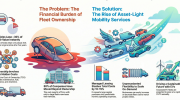The automotive world is ever-evolving, with manufacturers constantly reassessing their lineups to better align with market demands and consumer preferences․ One recent development that has caught the attention of car enthusiasts and casual observers alike is the discontinuation of the Nissan Kicks․ Launched in 2018, this compact SUV quickly gained a following due to its stylish design, affordability, and impressive fuel efficiency․ However, as the automotive landscape shifts, Nissan has made the tough decision to pull the plug on the Kicks․ But why?
The Rise and Fall of the Nissan Kicks
Initially, the Nissan Kicks was celebrated for its unique blend of compactness and spaciousness, making it an ideal choice for urban dwellers and families alike․ With a starting price that appealed to budget-conscious buyers, it offered a myriad of features often found in higher-end models, including advanced safety technology and a user-friendly infotainment system․
However, despite its initial success, the Kicks struggled to maintain momentum in an increasingly competitive market․ Several factors have contributed to its untimely demise:
1․ Shifting Consumer Preferences
As trends shift, consumer preferences have increasingly gravitated towards larger SUVs and crossovers․ The compact SUV segment, which the Kicks occupied, has seen a decline in popularity as buyers seek vehicles that offer more cargo space, seating capacity, and versatility․ Larger models, such as the Nissan Rogue, now dominate the market, leading to a natural decline in interest for smaller offerings like the Kicks․
2․ Increased Competition
The compact SUV market is saturated with options․ Rivals like the Honda HR-V, Mazda CX-30, and Toyota C-HR have all made significant strides in recent years, boasting advanced features, superior performance, and overall higher brand loyalty․ The Kicks, while initially competitive, found it increasingly challenging to stand out in a crowded field filled with well-established players․
3․ The Electric Vehicle (EV) Revolution
As the automotive industry shifts towards sustainability and electric mobility, manufacturers are reallocating resources to develop electric and hybrid models․ Nissan has committed itself to expanding its EV lineup, focusing on models like the Nissan Ariya, which aligns with future trends․ This strategic shift means that less popular models like the Kicks may no longer fit into Nissan’s long-term vision․
4․ Economic Factors
The global economy has faced significant challenges, exacerbated by the COVID-19 pandemic, supply chain disruptions, and rising costs of materials․ As manufacturers reassess their production strategies, it’s common for less profitable models to be cut from the lineup․ The Kicks, while an appealing model, may not have performed well enough financially to justify its continued production amidst these challenging economic circumstances․
Looking Ahead
While the discontinuation of the Nissan Kicks marks the end of an era for this compact SUV, it’s essential to recognize that Nissan is not abandoning the compact segment altogether․ Instead, the brand is likely to focus on enhancing existing models and investing in new technologies to meet changing consumer demands․
Embracing Change: The Future of Nissan’s Lineup
While the discontinuation of the Nissan Kicks may seem like a setback, it opens doors to new opportunities for Nissan․ The automotive industry is in a state of flux, with manufacturers racing to innovate and adapt to the demands of a greener future․ Nissan has set its sights on producing more electric vehicles (EVs) and hybrid models, which are becoming increasingly popular among consumers who prioritize sustainability and efficiency․
Investing in Innovation
Nissan’s commitment to electrification is evidenced by its ambitious plans to expand its EV offerings․ The Nissan Ariya, a sleek electric crossover, is just the tip of the iceberg․ As the brand pivots towards electric mobility, the focus will be on integrating advanced technologies that enhance driving experiences while reducing environmental impact․ This strategic shift aligns with global trends and positions Nissan as a forward-thinking automaker․
Redefining the SUV Experience
With the growing popularity of larger SUVs, Nissan has the opportunity to redefine what consumers expect from their vehicles․ By consolidating resources towards developing versatile and spacious models, the company can cater to families and adventure-seekers who desire not only functionality but also cutting-edge technology․ This evolution will likely lead to the introduction of models that are more aligned with consumer needs, including features like improved safety systems, enhanced infotainment, and adaptable interiors․
Customer Engagement and Feedback
As Nissan navigates this transition, customer feedback will play a critical role in shaping future models․ Engaging with consumers through surveys, social media, and focus groups will provide valuable insights into what buyers truly want․ By staying attuned to market trends and customer expectations, Nissan can create vehicles that resonate with their audience and foster brand loyalty․
The discontinuation of the Nissan Kicks may signify the end of one chapter, but it also heralds the beginning of an exciting new era for the brand․ With a focus on electric vehicles and a commitment to innovation, Nissan is poised to meet the evolving demands of the automotive market․ As they transition from compact models to more expansive, technologically advanced offerings, consumers can look forward to a lineup that prioritizes sustainability, safety, and style․
In a world where change is the only constant, Nissan’s adaptability and forward-thinking approach will be crucial in securing its place in the hearts of drivers everywhere․ The road ahead is undoubtedly filled with challenges, but with the right vision and execution, Nissan is set to steer into a promising future․
Consumer Sentiment and Brand Loyalty
As the automotive market evolves, brand loyalty remains a pivotal aspect of consumer behavior․ Many drivers develop a strong attachment to specific models and manufacturers, often influenced by past experiences or the reputation of the brand․ Nissan has historically been known for its reliability and innovation, traits that have endeared it to many consumers․ However, the discontinuation of the Kicks could risk alienating some of its dedicated customer base, particularly those who appreciated the compact SUV for its unique offerings․
Nissan’s challenge will be to ensure that loyal Kicks owners feel heard and valued․ Engaging with customers through targeted communications, loyalty programs, and community-building efforts can help reinforce relationships and mitigate any sense of loss․ By fostering a dialogue, Nissan can gain insights into what features and designs resonate with consumers, guiding future developments․
The Broader Industry Context
The automotive industry is currently facing unprecedented changes driven by technology, environmental concerns, and shifting consumer expectations․ As manufacturers pivot towards electric and hybrid vehicles, the emphasis on sustainability is paramount․ This transition is not just an environmental imperative but also a response to increasing regulatory pressures and the demand for greener alternatives․
For Nissan, discontinuing the Kicks may signify a strategic realignment, allowing it to focus on models that better align with the company’s commitment to sustainability․ The push towards electrification is not merely a trend but a necessity in a world grappling with climate change․ As such, Nissan’s resources will likely be directed towards developing vehicles that are not only stylish and efficient but also environmentally friendly․
What Comes Next for Nissan?
With the Kicks out of the picture, Nissan is presented with a unique opportunity to innovate․ The focus will likely shift to enhancing existing models like the Rogue and Pathfinder, which appeal to the growing consumer demand for larger, more versatile vehicles․ Additionally, Nissan’s investment in electric models such as the Ariya represents a commitment to leading the charge in the EV market․
Furthermore, Nissan could explore the possibility of introducing new models that blend the best features of the Kicks with the spaciousness and performance of larger SUVs․ By integrating feedback from former Kicks owners, Nissan can craft a vehicle that captures the spirit of the Kicks while addressing the market’s evolving needs․
The discontinuation of the Nissan Kicks may be viewed as a loss for fans of the compact SUV, but it also opens the door to exciting possibilities for Nissan as a brand․ The automotive landscape is changing rapidly, and adaptability is crucial for survival․ By redirecting its focus towards larger, more sustainable vehicles, Nissan is positioning itself to thrive in an era defined by innovation and environmental responsibility․
As Nissan embarks on this new journey, one thing is clear: the future holds promise․ With a renewed commitment to electrification and consumer engagement, Nissan is not merely saying goodbye to the Kicks; it’s setting the stage for what comes next in the dynamic world of automotive design and technology․ For consumers, the evolution of Nissan’s lineup will be worth watching as the brand seeks to redefine its identity in a competitive market․

